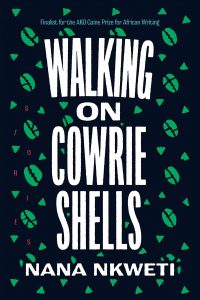Maya C. James Reviews Walking on Cowrie Shells by Nana Nkweti
 Walking on Cowrie Shells, Nana Nkweti (Graywolf Press 978-1-644-45054-3, $16.00, 200pp, tp) June 2021.
Walking on Cowrie Shells, Nana Nkweti (Graywolf Press 978-1-644-45054-3, $16.00, 200pp, tp) June 2021.
Nana Nkweti offers ten heart-warming and heart-wrenching stories that span genre, time, and species in her debut collection Walking on Cowrie Shells. From literary realism and romance, to speculative fiction and mystery, Nkweti tackles themes of familial and cultural expectations, all with effortless style and detail.
Nkweti’s writing style is a mixture of sobering truths and eccentric scenarios spun into a glittering explosions – details are absolutely vivid and metaphors always clever. She takes risks with her writing and lands on her two feet each time. In opening story “It Takes a Village Some Say”, readers are introduced to the Salikis, an upwardly mobile Cameroonian family that have adopted “Our Girl’’: a young girl “imported straight from the motherland.” The point of view is written in a hybrid second-person/first-person perspective, with the Salikis speaking as a collective, naïve, “we” in part one, and their daughter speaking from a bitter, first-person perspective in part two. Unfortunately for the parents, their desperate scramble for higher social status nosedives after their daughter begins an elicit and lucrative trade. Nkweti’s biting commentary on appearances and the politics of fertility and family was both entertaining and harrowing to read. Many of her stories are delightfully suspenseful, with realistic stakes, even in mundane settings.
My favorite story in the collection is “The Living Infinite” a hauntingly gorgeous story of love and memory nestled between disaster and heartbreak. Nala, a Mami Wata, falls in love with Byron, a charming human fisherman from New Orleans. Rather than spend her days without him, she relinquishes part of her powers to marry Byron and live on land with him. There is anticipatory grief in the fact that Byron will soon grow old and die, and Nala must again determine the life she wants to live after his passing. While his death will ultimately free her to return to the waters, she will never be the same without Byron’s presence. This story dances with perfection – the pacing, emotion, and ties to environmental disasters in the region gave me Southern Gothic vibes that reminded me of N.K. Jemisin’s best short stories.
“It Just Kills You Inside” focuses on the exploitative nature of colonizing countries after a zombie outbreak impacts the African continent. I was unsure if it was length, or some other constraint, but it was difficult to follow the story and fully appreciate it, considering Nkweti has a clear vision for the rest of her stories. “Night Becomes Her” is a hidden gem within the collection – Zainab, a refugee from Cameroon, works as a nightclub assistant during the graveyard hours. She steals moments of joy in between helping girls fix themselves up in the bathroom. Interspersed into her story is the story of Fatima, the 16-year-old girl recruited to detonate the bomb that killed Zainab’s mother, made her father a shell of himself, and caused her to become a refugee.
Whenever a story made me laugh, it was with genuine laughter – Nkweti creates wry yet vivid depictions of her characters, almost every single of them awkward and surprisingly judgmental of their more socially adept counterparts. Walking on Cowrie Shells is honest and authentic, but limited at the same time, particularly when it comes to its stereotypical, reductionist depiction of Black American life.
One reason I gravitated towards Walking on Cowrie Shells was because Nkweti’s work is marketed as showcasing the “complexity and vibrance of Cameroonian and American cultures.” The tricky dynamic between many African, Black American, and blended cultures is difficult to navigate within the US, let alone write about in an authentic and meaningful way. While Nkweti creates some nuanced characters, her depiction of Black life in America is at times startlingly bad; many of the African Americans portrayed in the story are villains; always seeking a way to prove their worth and identity in a way that seemed inauthentic and ignorant at best.
Some of her character names seemed cherry-picked from internet memes and old comedy sketches that capitalized on unfavorable depictions of Black women as welfare queens and Jezebels. In “The Devil is a Liar’’, one character named LaDasha (spelled La – a) is impoverished, aggressive, functionally illiterate, and constantly bearing children (yikes). Weirdly enough, she weaponizes her fertility against protagonist Temperance, who has had publicized trouble conceiving her first child. This aggression seemingly comes out of nowhere, and La – a isn’t permitted any kind of nuanced interior life to explain why she wants to pick on Temperance.
What makes these portrayals stand out even more is how they are juxtaposed with extremely well-written characters that are found throughout the book. In “The Devil is a Liar’’, a first lady doubts her husband’s ability in to be a pastor and her ability to be a mother. In “Rain Check at MomoCon” a lanky Black nerd enjoys manga and cosplaying, despite her parents’ overbearing expectations of obedience. Now imagine these characters in the same cast as girls who are only known for being named after cars, calling our protagonist “African booty scratcher” on playgrounds, or for their sexually charged escapades in high school. The Black women (and young girls, too) are not permitted the same amount of depth and nuance as their Cameroonian, or “Halfrican” (Half-American, Half-African) counterparts. Their flaws go unredeemed, or worst, poorly explained as jealousy over a seemingly barren sense of culture (there’s not enough space to discuss that here, though).
Rather than celebrate two cultures, it seemed that they were put in stark opposition to one another, with Black American life highlighted in a consistently negative light. I would have loved to see more depth to the antagonists of the stories, or better yet, not have most of the Black American women be aggressive, baby-riddled antagonists. “Dance the Fiya Dance” and “Mami Wata” had the best treatment of these characters, and actually gave them a fair shot at being fully fleshed out human beings.
At the end of the day, it matters quite a bit to readers like myself that marginalized voices get a fair shot at a nuanced depiction. While Walking on Cowrie Shells did not fully deliver that, it was vivacious and confident – Nkweti’s steady hand guides us over the sharp cowrie shells of identity, desire, and the pressure cooker of expectations, all with a style and rhythm that is rare to find.
Maya C. James is a graduate of the Lannan Fellows Program at Georgetown University, and full-time student at Harvard Divinity School. Her work has appeared in Star*Line, Strange Horizons, FIYAH, Soar: For Harriet, and Georgetown University’s Berkley Center Blog, among others. She was recently long listed for the Stockholm Writers Festival First Pages Prize (2019), and featured on a feminist speculative poetry panel at the 2019 CD Wright Women Writer’s Conference. Her work focuses primarily on Afrofuturism, and imagining sustainable futures for at-risk communities. You can find more of her work here, and follow her on Twitter: @mayawritesgood.
This review and more like it in the October 2021 issue of Locus.
 While you are here, please take a moment to support Locus with a one-time or recurring donation. We rely on reader donations to keep the magazine and site going, and would like to keep the site paywall free, but WE NEED YOUR FINANCIAL SUPPORT to continue quality coverage of the science fiction and fantasy field.
While you are here, please take a moment to support Locus with a one-time or recurring donation. We rely on reader donations to keep the magazine and site going, and would like to keep the site paywall free, but WE NEED YOUR FINANCIAL SUPPORT to continue quality coverage of the science fiction and fantasy field.
©Locus Magazine. Copyrighted material may not be republished without permission of LSFF.






